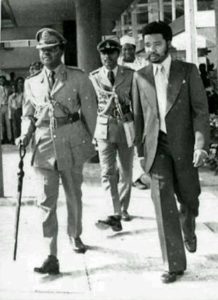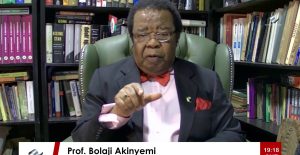By Hassan A. Saliu
Professor Akinwande Bolaji Akinyemi, the son of a priest and politician, is an academic colossus whose impacts on various aspects of Nigerian life cannot be captured in a single tribute. He is a scholar, policy maker, adviser, public intellectual and, a man with extensive academic engagements and networks who began his lecturing job at the premier University, Ibadan, after returning from the USA. He moved from there to Lagos to inject more life into the Nigerian Institute of International Affairs (NIIA) which was somehow enmeshed in succession politics. He has also served as a Minister and has continued to carry out some administrative assignments for the Nigerian State. One can therefore understand why the public space is filled with congratulatory messages that have kept pouring in for Professor Bolaji Akinyemi, a Professor of Political Science, trail-blazer and public analyst, who has dominated the ideas space for more than five decades.

The much younger Akinyemi in the vortex of power
He is not showing any signs of getting tired soon apparently because there are still many issues to discuss about Nigeria, especially in its relations with rest of the world. He is a delight to watch and listen to when issues of international relations are up for mentioning and analysis. Truth be told, Professor Akinyemi is a pathfinder whose impact goes beyond the books he has written. Some Professors, including this author, got their strong motivation and interest in the field of International Relations from his impressive showings, hallmarked by his calmness, confidence, deep and historical exposition and gesticulations to effect, that he displayed on various public platforms that were available to him in the 1970s and 1980s.
Arguably, he remains the most successful Director- General of NIIA, judging by the public image of the Institute under him; his frequent interventions in policy that almost got his fingers burnt; the level of collaborations with similar agencies across the world; the numerous outcomes of conferences; and the record of publications by the Institute under his headship. As the DG, he was courageous at seizing the space for his interventions for testing his textbook theories of International Relations (IRs), most notably, the Realist Theory.
Perusing through some of his writings, one would also discover that he is a living idealist who, at a time, and borne out of frustration with the situation in the apartheid enclave, once called for the adoption of black bomb in dealing with the former obnoxious regime in South Africa. His belief in idealism also showed in his concept of Prior- Consultations and in wanting Nigeria to carry more burden for the African continent, notwithstanding the mounting domestic problems facing the country.
He is, however, known more for his relentless calls for resisting Western dictations by positing that even in the world that is decidedly more in favour of the west, Nigeria can still provide leadership for countries of the South by increasing its presence and visibility in the world. Concepts such as Concert of Medium Powers, Technical Aid Corps, African Petroleum Producers Association, among others, were bold initiatives enunciated by him that sought to raise the voice of Nigeria in world affairs in line with his realist orientation.
As a Minister, he had tried to actualise these his pet projects, some of which the recent events in the world have proven that he was a prophet of sorts (apologies to Prof. Akinterinwa). The point needs to be made that the pursuit of the initiatives made him to be popular in some quarters, they nevertheless created some problems for him in the cabinet that he was a part of.
His exit from the Babangida government is still a mystery to many perhaps, including Professor Akinyemi himself who, one can say, was doing well at his post. At a point, some extra-foreign policy matters were raised and ceaselessly deployed against him with the intention of getting him out of office. His handling of the issue of the State of Israel appeared to be the last straw that broke the camel back. The thrust of his submissions on the matter was perceived differently by various actors that were involved. It is instructive to note that the upper hand gained by those who were opposed to his offering on the matter of Israel subsequently got him out of office. He was accused of being pro-Israel apparently because of the trajectory of his life, while Israel itself felt unease with him on some issues. One would be correct therefore to say that he was one of the few misunderstood Foreign Ministers in Nigeria.
 To some, he was not radical enough; he was at best a reformist or what they would call ultra-liberal. There are still people who think he was a western apologist as a Minister. Certainly, there must have been a kind of mis-categorization of his person and the ideas he pursued in office. My personal observation is that he tried his best to project Nigeria as far as he could but his steps were always being misread, most times on primordial and ideological grounds. Prof. Akinyemi as a Minister was a victim of circumstance or that of the then prevailing environment of suspicion where everyone, including his academic colleagues were no longer comfortable with his postulations. He was alleged to be implementing a certain agenda even by the Superpowers. He seemed to have incurred the wrath of China as the DG of NIIA when he demanded that the communique of his committee’s meeting with the Chinese team should be drafted jointly. No major power fancies the idea of a jointly produced communique with Africa but the unilateral one for the obvious advantage it confers on them.
To some, he was not radical enough; he was at best a reformist or what they would call ultra-liberal. There are still people who think he was a western apologist as a Minister. Certainly, there must have been a kind of mis-categorization of his person and the ideas he pursued in office. My personal observation is that he tried his best to project Nigeria as far as he could but his steps were always being misread, most times on primordial and ideological grounds. Prof. Akinyemi as a Minister was a victim of circumstance or that of the then prevailing environment of suspicion where everyone, including his academic colleagues were no longer comfortable with his postulations. He was alleged to be implementing a certain agenda even by the Superpowers. He seemed to have incurred the wrath of China as the DG of NIIA when he demanded that the communique of his committee’s meeting with the Chinese team should be drafted jointly. No major power fancies the idea of a jointly produced communique with Africa but the unilateral one for the obvious advantage it confers on them.
Notwithstanding, some theoretical issues that he led the country into adopting are still surprisingly the central themes in Nigeria’s foreign policy. For instance, the attempt made to seek for more inputs of Nigerians in the pursuit of the country’s foreign policy, which he spearheaded and held at NIPSS, Kuru, in 1986 is being agitated for in the country as a desiderata in rejuvenating Nigeria’s contemporary foreign policy. One recalls that the concept of BRICS being a topical issue in the world today was substantially similar to some of his ideas promoted as Foreign Affairs Minister of Nigeria.
Out of NIIA, Prof. Akinyemi returned to the University of Lagos for teaching assignments for a while, after which he pulled out and caught the limelight again, taking after his father, as a scholar-politician, who had attempted to be Nigeria’s President. Somewhere along line, he dropped out of the ambition for MKO Abiola, the eventual winner of the June 12 1993 presidential election. The annulment of the election by the Babangida regime and the emergence of Sani Abacha as a maximum ruler with his zero-tolerance for opposition pushed Prof. Akinyemi into nomadism; moving from one western capital to another calling for support to end military rule in Nigeria and to avoid being arrested by the Abacha regime. He was part of the National Democratic Coalition, NADECO, that was out to fight for the validation of June 12 1993 presidential election results.
As a man destined to be a witness to some political events, he was made a member of the Electoral Reforms Committee instituted by President Yar’Adua, the Deputy Chairman of Jonathan’s National Conference, among others. On each occasion, he had tried to blend theory with praxis with a mixed result that one can summarise as impressing some and offending some others but no one could dismiss his brilliance.
At the level of NPSA, he was a witness to its formation in 1973 as an initiator at Nsukka. Ever since, he has remained a consistent senior member of our Association. He, indeed, kick-started our flagship programme christened the NPSA Platform in 2021 where he spoke on Federalism and Nigeria’s Foreign Policy. He was one of the first set of Political Scientists who were awarded the prestigious fellows of NPSA in 2019, in recognition of his varied contributions to the field of Political Science in Nigeria.
On behalf of the executives of our Association, I congratulate the pathfinder, a courageous scholar, notable policy advocate and public intellectual on his 82nd birthday. Happy birthday to our mentor, teacher and a senior Political Scientist. We wish him more good health and long life in showing the way in finding the necessary compass with which to navigate our country away from its largely man-made inflictions.
The author is a Professor of Political Science and President of the Nigerian Political Science Association (NPSA)




























